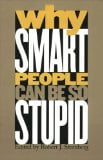 Why Smart People Can be So Stupid
Why Smart People Can be So Stupid
by Robert J Sternberg (Editor)
Yale University Press, £12.50, ISBN 0300101708
The title alone triggers a cascade of questions. Is smart the same as intelligent? Does that mean that stupid is a synonym for unintelligent? What kind of behaviours are stupid anyway? These are tricky questions to answer, even though we all have an intuitive idea of what smart and stupid are, just as we all know smart people who behave in ways that are irrational (does that mean that rational and smart are the same thing?).
The contributors to this interesting and eclectic collection of papers attempt to unravel the ins and outs of the topic and to cast some light on an issue that is rarely addressed in anything but colloquial terms. The tone of the pieces here, in contrast, are decidedly on the academic side, though not to the extent that they are inaccessible to all but the expert. A couple of papers stand out in particular.
One case of a smart person acting dumb that is analysed in some detail is that of Bill Clinton. Diane Halpern does a good job of deconstructing the Monica Lewinsky scandal. This is, most people would agree, a case where someone nominally quite smart engaged in a behaviour that was incredibly dumb. Rather than adopt a moralistic tone, the author analyses Clinton’s behaviour in terms of his previous history. He had been getting away with similar activities for years and had survived. One of his errors, according to Halpern, is that he had not adapted to the changed circumstance of being in the Whitehouse. In this respect stupid behaviour is related to a failure to adapt to the environment.
In contrast David Perkins, in Engines of Folly, analyses the problem using the tools of complexity theory. In this fascinating paper he uses the ideas of self-organised criticality and emergent properties of complex systems to propose a theory of behaviour that encompasses various forms of folly. In identifying changes in patterns of activity as of prime importance, Perkins suggests that it may be possible to address folly. Perhaps, he suggests, people do not necessarily have to be so stupid so often.
In any case, this book makes for an intriguing read.

